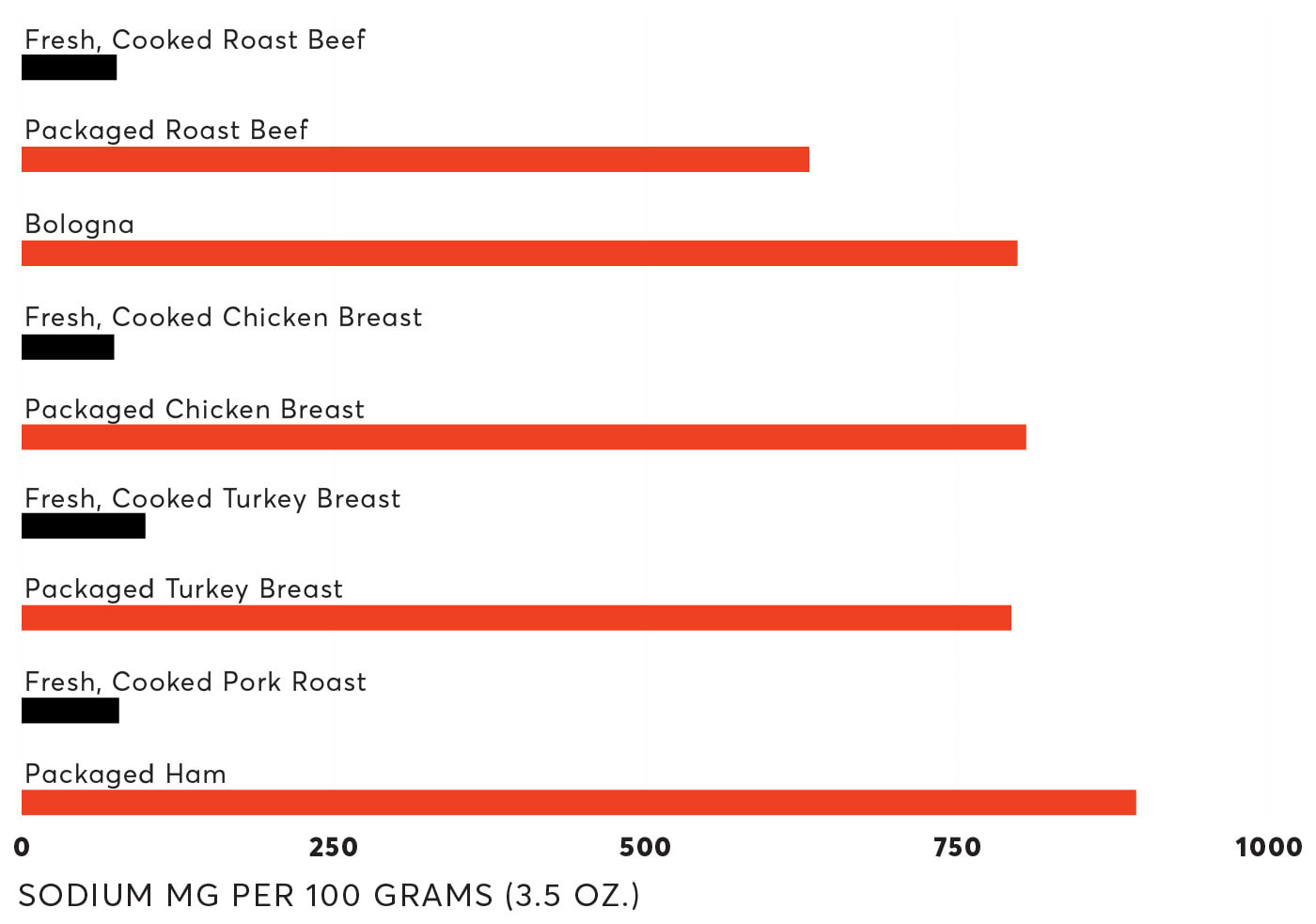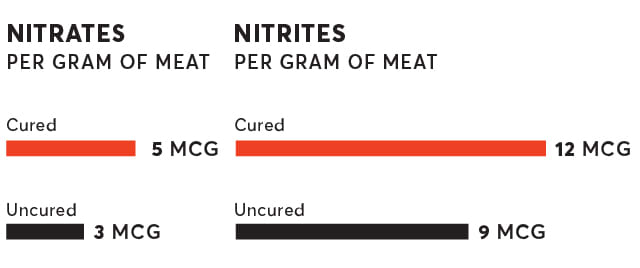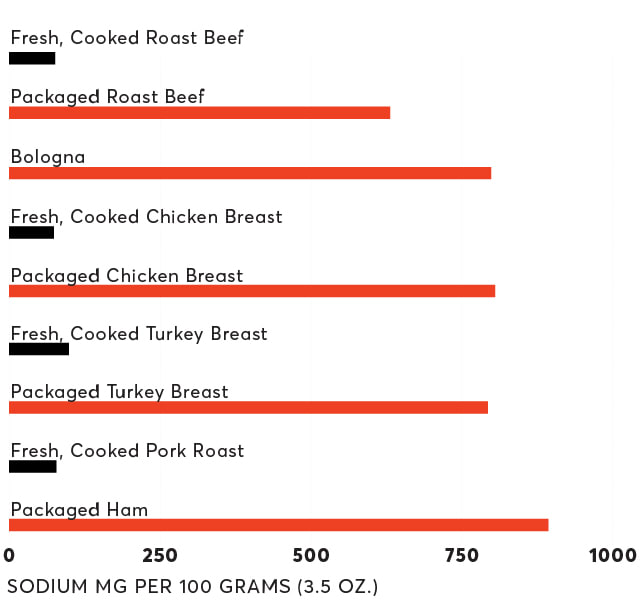Can a Pregnant Woman Eat Boar's Head Lunch Meat

When you're looking for a healthy deli sandwich, you probably choose lean turkey over fatty salami. And if you're like close to half the deli-meat eaters in a recent nationally representative CR survey of 1,000 people, you'd probably go for the meat labeled "no nitrates or nitrites added."
But while turkey is among the leanest deli meats, in the big picture it may not be healthier than other types. That's because all cold cuts are processed meats, like bacon and hot dogs. Regularly eating them—even in amounts less than what you probably put in a sandwich—clearly increases the risk of cancer. They've also been linked to heart disease, stroke, and type 2 diabetes. And though avoiding nitrates and nitrites is a good idea—they're probable carcinogens, according to the World Health Organization—choosing "no nitrite" (also labeled uncured) meats isn't better.
Why not? "Thanks to the topsy-turvy world of government food labeling rules, 'no nitrites' doesn't mean no nitrites," says Charlotte Vallaeys, senior food and nutrition policy analyst at CR. Instead, it means that the nitrates and nitrites used to "cure"—or preserve and flavor—meat come from celery or other natural sources, not synthetic ones, such as sodium nitrate or nitrite.
To further confuse matters, "their chemical composition is absolutely the same, and so are the health effects," says Joseph Sebranek, Ph.D., Morrison Endowed Chair in meat science at Iowa State University.
But don't "uncured" cold cuts at least have lower amounts of those compounds? Nope, according to CR's recent tests of 31 deli meats. Products cured with nitrates and nitrites from natural sources had average levels of the chemicals that were similar to those cured with synthetic ones. And it didn't matter what type of meat it was—chicken, ham, roast beef, turkey, or salami.
Nitrates and nitrites aren't the only problem with deli meats, either. Some contain coloring agents that may pose health risks. They're also often loaded with sodium. To top it off, cold cuts are prone to contamination with Listeria monocytogenes, a potentially deadly type of bacteria.
That's why CR looked not only at nitrate and nitrite levels but also at sodium, listeria, and a compound called 4-MEI, a potentially harmful byproduct of some caramel colors.
Here's what we found—and what you need to know about deli meat to stay safe and healthy.
The Risks of Nitrites
Nitrates and nitrites prevent bacterial growth and give deli meat its distinctive color and flavor. But there's a downside. Nitrates convert to nitrites, and when nitrites interact with protein, that creates compounds called nitrosamines—which may cause cancer.
The North American Meat Institute (NAMI), an industry group, says that most nitrites in our diets come from vegetables. "But there's little protein in vegetables, so their nitrites don't easily convert to nitrosamines," says Michael Hansen, Ph.D., a senior scientist at CR. "It may also be that antioxidants or other compounds in vegetables prevent nitrites from becoming nitrosamines."
Synthetic nitrites have been used since the 1920s to speed up the curing process. But when health concerns about them surfaced in the 1960s, some manufacturers began processing meat without any nitrites.
"These were gray, didn't hold flavor, and were susceptible to bacterial spoilage," Sebranek says. To alert consumers to those products, which are now rare, the Department of Agriculture required that they be labeled "uncured."
Then, in the 1990s, companies developed new ways to cure meats with celery or other natural nitrate/nitrite sources. But the USDA decided that because the source of the compounds differed, meats made with them must be labeled "uncured" and "no nitrates or nitrites added," Sebranek says, "even though everyone in the meat industry realizes it's not technically correct."
Though uncured meats must also be labeled with a statement that clarifies that they have nitrates and nitrites from natural sources, that language is usually buried in fine print and doesn't explain that those compounds are chemically identical to synthetic ones.
Many meat processors believe that all deli meat should be labeled "cured," no matter which curing process is used, according to NAMI.
" 'Uncured' and 'natural nitrates/nitrites' makes people think these meats are healthier, but they aren't," says CR's Vallaeys. CR and the Center for Science in the Public Interest are asking the USDA to update its labeling rules. And we are also gathering consumer signatures for a petition to the USDA. You can sign it here.
The USDA told CR that it is evaluating the effectiveness of vegetable-based curing agents and what would be required to change the current rules.
14,524
Cancer cases linked to processed meat each year.

57,766
Deaths from heart disease, stroke, and type 2 diabetes tied to processed meat each year.
Sources: JNCI Cancer Spectrum, June 2019 and JAMA, March 2017.
What CR's Tests Found
CR focused on nitrates and nitrites, but we also looked at 4-MEI, listeria, and sodium.
Nitrates and nitrites: We tested 31 packaged deli meats—name brands and store brands—including chicken, ham, roast beef, salami, and turkey. (See "CR's Deli Meat Test Results," below.)
All samples had levels below the federal government's thresholds for deli meats: 500 micrograms per gram for nitrate and 200 micrograms for nitrite. But our tests also showed how confusing the labels can be. There were 10 "cured" meats in our tests and 21 "uncured." On average, the nitrate and nitrite levels were essentially the same.
4-MEI: We tested 12 packaged deli meats with caramel color in the ingredients list for 4-MEI—a byproduct of some caramel colors used in deli meat, colas, and other foods. Animal studies suggest that 4-MEI increases cancer risk, and in California any food that exposes consumers to more than 29 micrograms per day must carry a cancer warning label.
None of the meats we tested had more than that amount of 4-MEI in a 3-ounce serving. But some had high levels, up to 21 micrograms. "So some deli meats could add a significant amount of 4-MEI to your diet, especially if you eat a lot of them or get the compound from other sources," says Sana Mujahid, Ph.D., manager of food safety testing at CR.
Listeria monocytogenes: Cold cuts are known to be a risky food for listeria, and meats sliced at deli counters are more likely to be contaminated than packaged ones. CR tested 133 samples of sliced meat purchased in New York City delis. Two of them contained the bacteria—one with a strain involved in an outbreak of illnesses linked to deli meat and cheese that put eight people in the hospital (one person died). CR notified the NYC Department of Health and Mental Hygiene of our findings, and it addressed the issues.
Listeriosis, the illness caused by listeria, is rare but serious: More than 90 percent of people who get it are hospitalized, and 1 in 5 dies. The very old or young, and people with compromised immune systems, are more vulnerable. So are pregnant women, because the illness can cause miscarriage and stillbirth. The Centers for Disease Control and Prevention says that people in those high-risk groups should avoid deli meat entirely.
Sodium: CR nutritionists reviewed the sodium in 124 packaged deli meats from a variety of brands and compared it with the sodium in similarly sized portions of fresh meats, such as grilled chicken. On average, deli meats had 8 to 11 times the sodium content. (See "CR's Deli Meat Test Results," below.)
Too much sodium raises the risk of high blood pressure and heart disease. Experts advise keeping it under 2,300 mg a day. Cold cuts, and other cured meats, are the fourth-largest contributors of sodium in the U.S. diet, according to the CDC. "Cutting back on deli meat is an effective way to cut back on sodium," says CR nutritionist Amy Keating, R.D.
The Toll on Public Health
Processed meats can also contain other harmful substances. These include heterocyclic amines and polycyclic aromatic hydrocarbons, chemicals formed in meat cooked at high temperatures. And research suggests that too much of the iron found in beef and pork may enhance the conversion of nitrites to nitrosamines.
It's the combined effect of those and other factors that makes processed meat such a health hazard, says Fang Fang Zhang, M.D., associate professor at the Friedman School of Nutrition Science and Policy at Tufts University. Her research found that more than 14,500 new colorectal and other cancer cases in the U.S. annually could stem from processed meat. Other studies suggest a link between the meat and bladder and breast cancer. The World Health Organization, in fact, calls processed meat a known human carcinogen. It may also be responsible for almost 58,000 deaths from heart disease, stroke, and type 2 diabetes each year, according to a 2017 analysis in JAMA.
Most Americans consume more than enough processed meat to pose risks. It doesn't take much: Harvard researchers found that increasing processed red meat intake by just half a serving a day (½ ounce deli meat, ½ hot dog, or 1 slice bacon) raised the risk of dying over the next eight years by 13 percent. According to a 2019 study in the Journal of the Academy of Nutrition and Dietetics, on average we eat about 6 ½ ounces of processed meat each week, with deli meat as the top source. CR's recent survey found that almost half of Americans eat deli meat at least once a week. Among those with children under 12, 57 percent said their kids eat deli meat at least weekly.
Must You Give Up Deli Meat?
No, but you should sharply limit how much you eat. "There is no known safe level of processed meat," Zhang says.
Keating, at CR, suggests that "when it comes to your lunch, think outside the box." Try sandwiches made with tomatoes and mozzarella, roasted or fresh vegetables with avocado or hummus, or nut butters with apples, berries, or bananas instead of jam. Egg salad, canned salmon, or light tuna can also be good options.
When you do opt for meat, choose fresh meat. Stick with small amounts—about 3 ounces—of cooked turkey, chicken, or lean cuts of beef.
CR's Deli Meat Test Results
Nitrates and Nitrites in Deli Meat: Cured vs. Uncured
CR tested 31 packaged deli meats from nine companies for nitrates and nitrites: 365 Everyday (Whole Foods), Applegate Farms, Boar's Head, Great Value (Walmart), Hillshire Farm, Hormel, Open Nature, Oscar Mayer, and Plumrose. On average, the levels were almost the same for cured and uncured meats.

Sodium Levels: Cold Cuts vs. Fresh Cuts
CR's review of sodium levels in 124 packaged deli meats found that deli meat contains on average 8 to 11 times more sodium than a comparable type of fresh meat.

CR's Deli Meat Test Results
Nitrates and Nitrites in Deli Meat: Cured vs. Uncured
CR tested 31 packaged deli meats from nine companies for nitrates and nitrites: 365 Everyday (Whole Foods), Applegate Farms, Boar's Head, Great Value (Walmart), Hillshire Farm, Hormel, Open Nature, Oscar Mayer, and Plumrose. On average, the levels were almost the same for cured and uncured meats.

Sodium Levels: Cold Cuts vs. Fresh Cuts
CR's review of sodium levels in 124 packaged deli meats found that deli meat contains on average 8 to 11 times more sodium than a comparable type of fresh meat.

Editor's Note: This article also appeared in the October 2019 issue of Consumer Reports magazine.
—Additional reporting by Maggie Veatch and Nicole Wetsman
Can a Pregnant Woman Eat Boar's Head Lunch Meat
Source: https://www.consumerreports.org/deli-meats/danger-at-the-deli-cold-cuts-increased-risk-cancer-heart-disease/
0 Response to "Can a Pregnant Woman Eat Boar's Head Lunch Meat"
Post a Comment